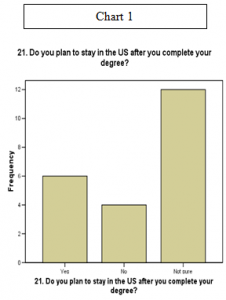Alyona Viktorovna Friedman and Dr. Tony Brown, German and Slavic Languages
Hypothesis
As an international student, I have observed what I thought to be a trend among my fellow students from Russian-speaking countries. I noticed that those who had a definite plan to remain in the U.S. after graduation spoke less Russian than those who were planning to return to their respective home countries. This observation turned into a hypothesis: the less Russian students speak, the more likely they are to plan to stay in the U.S. after completion of their degrees.
Methods
With the help of my mentor, I developed a 25-question survey, which included questions about the students’ use of Russian and English in their day-to-day lives, their attitudes about the Russian language, as well as some basic demographics. Having a desire to compare respondents’ real attitudes to the attitude they portray in their responses, they were given two options.
They could answer the survey in Russian or English. To ensure that the questions were unambiguous and easily understood the survey was pre-tested by fifteen people. Permission to use international students as subjects was needed to ensure their rights were protected. For this purpose I contacted International Services at BYU and BYU-Idaho. The decision to use both of these LDS universities came from a desire to have a larger sample size. After the necessary permission was obtained, I submitted an application to the Institutional Review Board (IRB) with letters of permission and the text of the survey.
Upon receipt of IRB approval, I proceeded to post the survey questions online on the survey host website surveymonkey.com. The subjects received an email from International Services with links to two versions of the survey. All of the possible answers were coded into statistical software SPSS, and as soon as a student’s response was received, I put the data into the computer. After answers of all 22 respondents were entered, I proceeded to statistically analyze the responses.
The results of my statistical analysis showed little support for my hypothesis. Of twenty-two respondents only three chose to answer the survey questions in English, two of them being native Ukrainian speakers, and one a Yiddish speaker. It came as a surprise, since I expected some native Russian speakers to answer in English because of the tendency to prefer English that I have observed.
Results
The sample turned out to be very heterogeneous. 86.4 % of respondents have lived in the US for more than 2 years. It appears that in the last two years there was a decline in the number of new students coming from Russian-speaking countries.
One of the survey questions, #21, asked “Do you plan to stay in the U.S. after you complete your degree?” Over half (54.5 %) of the respondents had not decided if they would return to their respective countries of origin upon their graduation or if they would stay in the US. Of those who had decided, 60 % planned to stay in the US, and 40% planned to return to their home country. (See Chart 1)
When asked how much Russian they used in their day-to-day lives, 40.9% of students reported that less than 25% of their daily communication was in Russian. Surprisingly, there were two people who reported that 75% or more of their daily communication was in Russian. There is a possibility that they reside in BYU Foreign Language Housing or that they live with Russian-speakers in some other setting.
Other interesting facts
Crosstabulation between marital status and post-graduation plans showed that there is not a significant relationship between a person’s marital status and their intent to stay in America or return to their home country. Also, all crosstabulation tests performed showed no significant relationship between factors of language maintenance and intent to return to one’s home country. This could be attributed to the small sample size or absence of homogeneity among the subjects.
Recommendations
There are several areas that need further research or development. There are many factors that could affect one’s decision to stay in the US or to go back to his home country. Examples could include marital plans or status, employment opportunities, educational opportunities, or possibly a belief that one country is a better place to live than another. In order to apply the survey results to the general population (all Russian-speaking students in the US or even all foreign students in the US) it would be necessary to have a larger sample.

